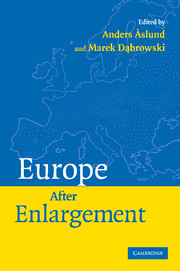Book contents
- Frontmatter
- Contents
- List of Charts, Tables, and Boxes
- Contributors
- Acknowledgments
- Introduction
- 1 Has Europe Lost Its Heart?
- 2 Economic Implications of the Social Provisions of the Stalled EU Constitution
- 3 Fiscal Policy and Fiscal Rules in the European Union
- 4 Design and Implementation of the Stability and Growth Pact: The Perspective of New Member States
- 5 Perspectives on the Lisbon Strategy: How to Increase European Competitiveness
- 6 Is Europe Reforming? Evidence from Cross-Country Structural Indicators
- 7 Recovery Growth as a Stage of Post-Socialist Transition
- 8 Comparative Oligarchy: Russia, Ukraine, and the United States
- 9 The Economic Rationale of the “European Neighbourhood Policy”
- 10 Economic Integration of Eurasia: Opportunities and Challenges of Global Significance
- Index
- References
2 - Economic Implications of the Social Provisions of the Stalled EU Constitution
Published online by Cambridge University Press: 04 December 2009
- Frontmatter
- Contents
- List of Charts, Tables, and Boxes
- Contributors
- Acknowledgments
- Introduction
- 1 Has Europe Lost Its Heart?
- 2 Economic Implications of the Social Provisions of the Stalled EU Constitution
- 3 Fiscal Policy and Fiscal Rules in the European Union
- 4 Design and Implementation of the Stability and Growth Pact: The Perspective of New Member States
- 5 Perspectives on the Lisbon Strategy: How to Increase European Competitiveness
- 6 Is Europe Reforming? Evidence from Cross-Country Structural Indicators
- 7 Recovery Growth as a Stage of Post-Socialist Transition
- 8 Comparative Oligarchy: Russia, Ukraine, and the United States
- 9 The Economic Rationale of the “European Neighbourhood Policy”
- 10 Economic Integration of Eurasia: Opportunities and Challenges of Global Significance
- Index
- References
Summary
Introduction
The growth of total factor productivity has been declining for several decades in the largest member states of the European Union. The program, which the EU announced at the Lisbon Summit in 2000 to reverse this trend, has so far failed. The passage of the halfway mark in the Lisbon Agenda calendar in 2005 was the occasion for numerous critical assessments and calls for renewed efforts to stimulate EU productivity.
In the midst of this productivity crisis, Europe is also constructing itself. In May 2004, it added ten new members. One month later, Valery Giscard d'Estaing handed a draft “Treaty Establishing a Constitution for the European Union” to the leaders of the expanded Union at a summit meeting in Thessaloniki. On May 29 and June 1, 2005, the electorates of France and the Netherlands rejected the Treaty in referenda and its ratification came to a halt. Will the Union eventually adopt principles and rules of governance that will allow it to function efficiently as a body of twenty-five? Will expansion continue? How will those processes affect the prospects for productivity and growth?
During the past two decades, the continuing development of the European Union has had an important liberalizing effect on its member states. The Single Market Act in 1986 and the implementation of the Economic and Monetary Union in 1999 have stimulated rationalization and restructuring. A single, anti-inflationary currency has slowly made competition in financial markets, and even competition in the market for corporate control, progressively more intense.
- Type
- Chapter
- Information
- Europe after Enlargement , pp. 29 - 49Publisher: Cambridge University PressPrint publication year: 2007



